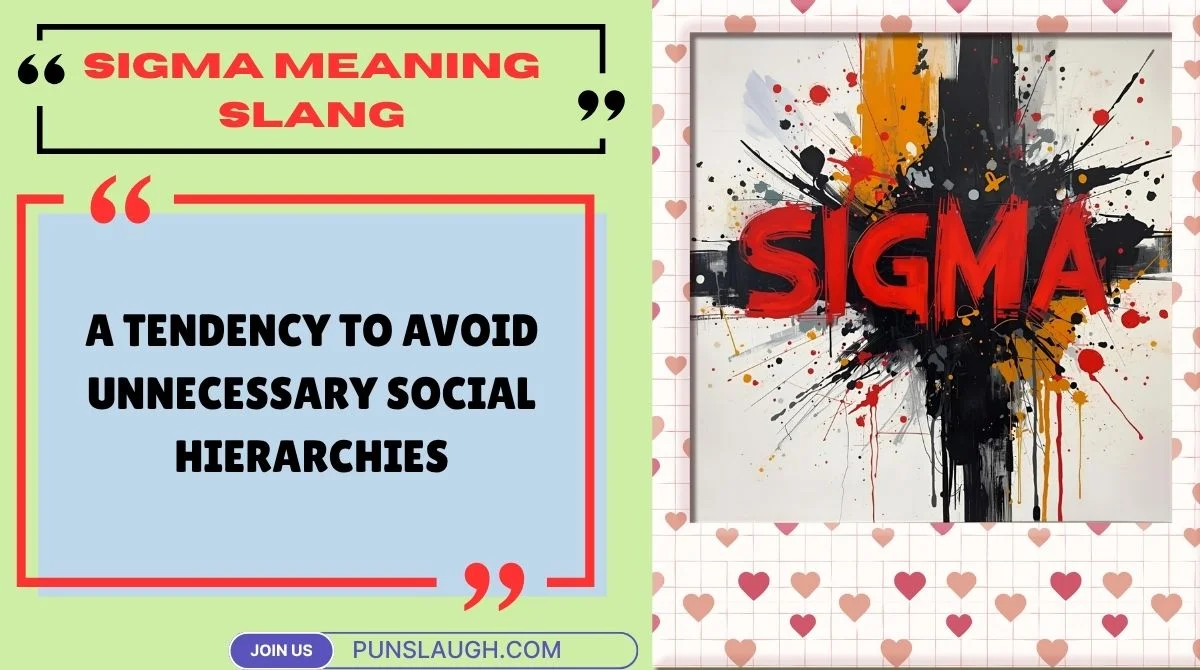In the ever-evolving world of internet culture, slang moves faster than most of us can keep up with.
One term that has gained serious traction in recent years is “Sigma”. If you’ve seen phrases like “Sigma male energy” or “She’s such a Sigma” trending on TikTok, Reddit, or Twitter, you’re not alone.
But what does Sigma mean in slang, and why has it become so popular?
This article dives deep into Sigma slang, exploring its origins, context, and real-world usage.
By the end, you’ll understand the term inside and out, including its positive and negative connotations, generational differences, and why social media loves it.
What Does “Sigma” Mean in Slang?
In modern slang, Sigma typically refers to someone who operates outside traditional social hierarchies.
Think of it as a personality archetype that values independence, self-reliance, and unconventional thinking.
Key traits often associated with Sigma include:
- Strong independence and autonomy
- A tendency to avoid unnecessary social hierarchies
- Quiet self-confidence rather than loud bravado
- Strategic thinking and emotional intelligence
Unlike Alpha personalities, who seek leadership and dominance, Sigma types often prefer doing their own thing without seeking approval. In essence, they’re the lone wolves of social structures.
Quick analogy: If Alpha is a lion leading the pride, Beta is the supportive pack member, Sigma is the wolf who roams alone but still commands respect.
Origins of Sigma Slang
The term “Sigma” comes from the Greek alphabet, where sigma (Σ, σ) is simply a letter. However, the modern slang usage is rooted in personality archetypes popularized in online discussions about social dynamics.
Psychologists and sociologists have long explored human hierarchies, but internet culture added a twist:
- Alpha: Leader, dominant, socially assertive
- Beta: Follower, supportive, less dominant
- Sigma: Independent, self-sufficient, outside the hierarchy
This adaptation became viral through forums like Reddit, gaming communities, and meme culture, where personality “labels” help people describe themselves or others humorously—or aspirationally.
Sigma in Different Contexts
Sigma in Male Slang
When used to describe men, Sigma often embodies the quiet, strategic loner. Traits include:
- Prefers solitude over social gatherings
- Self-made and confident without showing off
- Thinks before speaking, often underestimated
Social media often glorifies Sigma males as mysterious figures who don’t conform but still succeed.
Sigma in Female Slang
The concept applies to women too, though less commonly discussed. A Sigma woman:
- Is independent and career-focused
- Avoids unnecessary drama or social competition
- Exhibits quiet confidence and emotional intelligence
Female Sigma is increasingly recognized on platforms like TikTok, highlighting the non-gendered nature of the archetype.
Non-Binary & Inclusive Usage
Sigma traits are not limited by gender. Many communities now use “Sigma” as a personality descriptor rather than a strictly male/female label, making it more inclusive in modern slang.
Sigma Across Generations
Gen Z Slang Usage
Gen Z has embraced Sigma slang on platforms like TikTok and Twitter. Typical phrases include:
- “That’s pure Sigma energy”
- “She’s a Sigma queen”
- “I’m living my Sigma life”
It’s often used humorously, sometimes ironically, but the underlying concept of independence and anti-conformity remains.
Gen Alpha Emerging Trends
Even younger Gen Alpha users are beginning to interact with the term through memes and family-shared content, especially as older siblings and social media influence their vocabulary. Expect Sigma references to evolve further as Gen Alpha matures online.
Sigma Across Platforms
Urban Dictionary Definitions
Urban Dictionary offers numerous definitions, most emphasizing:
- Lone-wolf mentality
- Independence and intelligence
- Minimal interest in social validation
“A Sigma male doesn’t need a pack; he thrives alone.” – Urban Dictionary
TikTok & Meme Culture
TikTok popularized Sigma memes, often using humor or exaggerated scenarios. Examples include:
- Clips showing “Sigma behavior” in everyday life
- Contrasts between Sigma vs Alpha characters
- Challenges like “Describe your Sigma energy in 3 words”
Social Media & Gaming
Gaming communities, Discord servers, and Reddit threads frequently use Sigma slang to describe players who strategize independently or resist cliques.
Positive vs Negative Connotations
While Sigma can be aspirational, it’s not universally positive.
Positive traits:
- Self-reliance and independence
- Strategic thinking
- Mysterious or intriguing personality
Negative traits:
- Social isolation or detachment
- Perceived arrogance
- Overuse as a meme, leading to ironic or exaggerated usage
Table: Sigma Traits vs Common Misconceptions
| Trait | Sigma Reality | Misconception |
|---|---|---|
| Independence | Works well alone | Avoids teamwork entirely |
| Confidence | Quiet, understated | Arrogant or cocky |
| Social Interaction | Selective, meaningful | Anti-social or rude |
| Hierarchy | Outside it by choice | Rejects authority for no reason |
Real-Life Examples of Sigma Slang
Here’s how Sigma appears in everyday conversations:
- Twitter: “I’m not lonely; I’m just living my Sigma life.”
- Reddit: “She’s a Sigma queen, doesn’t need anyone’s approval.”
- Gaming Discord: “Our Sigma teammate carried us solo and didn’t complain once.”
These examples show that Sigma is more about mindset than action.
Sigma vs Other Archetypes
Comparing Sigma to other personality types helps clarify the term:
| Archetype | Description | Social Behavior |
|---|---|---|
| Alpha | Dominant leader | Takes charge openly |
| Beta | Supportive follower | Goes along with the group |
| Sigma | Lone wolf | Independent, self-directed |
| Gamma | Socially awkward, introverted | Rarely leading or following |
| Omega | Outcast, non-competitive | Avoids social hierarchy |
Sigma stands out because it operates outside hierarchy without being disengaged or weak.
Criticism and Misuse of Sigma
- Overuse in memes has made “Sigma” a joke term for some internet users.
- Some brands and influencers exploit Sigma for clickbait and relatability marketing.
- Gender bias occasionally mislabels assertive women as “Sigma” in a derogatory sense.
- Critics argue the term can promote unrealistic social expectations, especially for teens.
Should Parents or Adults Be Concerned?
Parents might notice teens using Sigma slang in chats or memes. Here’s what to know:
- Not inherently harmful: Most usage is playful or aspirational.
- Awareness helps: Understanding online slang improves communication with Gen Z.
- Encourage balance: Independence is positive, but isolation or detachment should be monitored.
In short, Sigma is mostly harmless cultural shorthand, but context matters.
FAQs About Sigma Meaning Slang
What does it mean to be a Sigma male or female?
Being Sigma means being independent, self-reliant, and operating outside traditional social hierarchies.
Is Sigma personality real or just internet hype?
While rooted in personality archetypes, modern Sigma slang is amplified by memes, social media, and generational trends.
Can anyone be Sigma, or is it personality-specific?
Anyone can exhibit Sigma traits, but some people naturally align with the archetype more than others.
How is Sigma different from Alpha or Beta?
Alpha seeks dominance and leadership, Beta supports others, while Sigma chooses independence without competing for social power.
Should adults be worried if teens identify as Sigma?
Not necessarily. Most usage is playful. Concern only arises if it encourages extreme social isolation or detachment.
Conclusion
The Sigma meaning slang has grown beyond a simple internet joke into a widely recognized personality archetype.
From TikTok memes to gaming communities, Sigma represents independence, self-reliance, and quiet confidence.
While the term has its critics and misuses, understanding it gives insight into modern internet culture and generational communication.
Whether you identify as Sigma, know someone who does, or just want to understand the trend, it’s clear that this archetype has carved a niche in online slang—and it’s here to stay.





